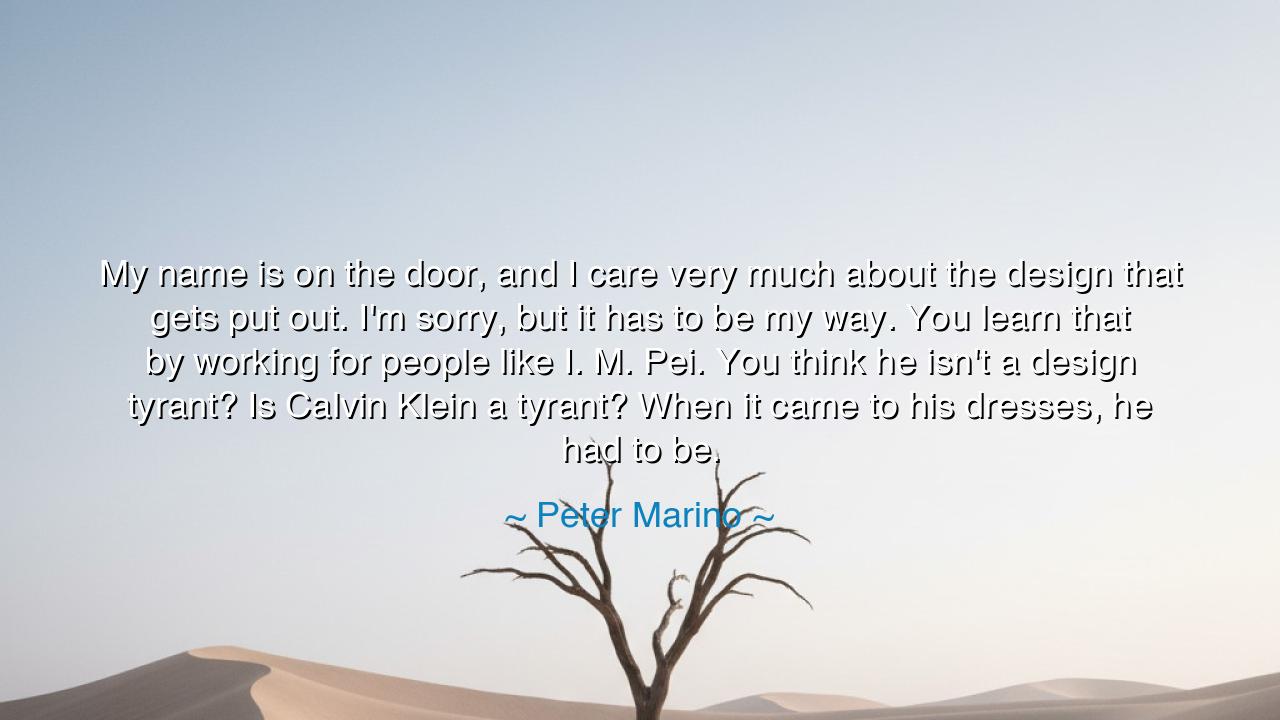
My name is on the door, and I care very much about the design
My name is on the door, and I care very much about the design that gets put out. I'm sorry, but it has to be my way. You learn that by working for people like I. M. Pei. You think he isn't a design tyrant? Is Calvin Klein a tyrant? When it came to his dresses, he had to be.






The architect Peter Marino, known for his audacious vision and devotion to perfection, once proclaimed: “My name is on the door, and I care very much about the design that gets put out. I’m sorry, but it has to be my way. You learn that by working for people like I. M. Pei. You think he isn’t a design tyrant? Is Calvin Klein a tyrant? When it came to his dresses, he had to be.” In these fierce and unapologetic words lies the timeless truth of authorship, discipline, and responsibility. Marino does not speak merely of pride, but of duty—the sacred obligation of the creator to guard the integrity of his vision, even when it demands hardness. His words are the echo of every master who has ever carved beauty from chaos and refused to let compromise dull the blade of creation.
To say “My name is on the door” is to declare ownership not of power, but of consequence. The artist, the architect, the designer—when they lend their name to a work, they also lend their soul. Marino reminds us that the creator must stand as a steward over his creation, accountable not to comfort or consensus, but to excellence. The world may call it tyranny, but the ancients called it integrity—the unwavering devotion to one’s purpose. To lead others toward a vision is not to rule them unjustly, but to anchor them to the standard that gives the work its truth. For if the vision falters, it is not the world’s name that suffers—it is the creator’s.
He speaks, too, of his teachers: I. M. Pei and Calvin Klein, both titans of form and restraint. They were, as he says, “design tyrants”—not because they loved control for its own sake, but because they knew that greatness does not arise from hesitation. Pei, who shaped light through stone in works like the Louvre Pyramid, ruled his projects with a quiet but unyielding will. Every line, every shadow was chosen with purpose. He understood that art without authority is chaos, and that beauty must be defended against compromise. So too did Calvin Klein, who sculpted elegance from minimalism, insisting that every seam, every fold must embody his philosophy of purity. Their so-called tyranny was the price of coherence—the cost of making something that speaks with one clear voice rather than a thousand confused ones.
History honors such determination. Think of Michelangelo, who toiled for years beneath the dome of the Sistine Chapel. When others tried to dictate his designs, he defied them—even the Pope himself—because he knew that the work must bear his spirit or it would be false. Or consider Alexander the Great, who refused to delegate the shaping of his empire’s culture to lesser minds, insisting that his vision of unity—of East and West combined—would not be diluted. Whether in marble, empire, or design, those who leave their mark on eternity are those who dare to say, as Marino did, “It has to be my way.”
Yet Marino’s words also conceal a gentler truth. The “tyrant” he speaks of is not cruel; he is responsible. To lead a team, to build something lasting, is to bear the burden of judgment. The designer must often say no when others plead for ease, must cut when others wish to add. This discipline, harsh as it seems, is an act of love toward the craft. For the master’s tyranny is not toward people, but toward mediocrity. He is bound by the laws of proportion, truth, and vision—and he cannot betray them without betraying himself. In that fidelity lies his freedom.
In our time, when collaboration is prized above conviction, Marino’s words strike like a hammer upon the anvil of complacency. He reminds us that vision demands leadership, and leadership demands courage. To stand firm in one’s purpose is not arrogance but stewardship. The world is full of unfinished dreams—projects diluted by committee, art softened by compromise. Yet history remembers those who dared to be demanding, who insisted that the flame of their idea burn without interference. The tyrant of design is, in truth, the servant of excellence.
Therefore, let this be the teaching: Be kind in spirit, but fierce in purpose. When your name is on the work—be it a building, a poem, a family, or a life—guard it with all the strength you have. Accept the burden of being called stubborn if it means remaining true to what you know is right. Learn from the masters who came before you: from Pei, who disciplined form; from Klein, who perfected simplicity; from Michelangelo, who would not bend. Greatness is not born from agreement—it is born from conviction. And though the world may call it tyranny, time will call it mastery.
So, stand by your door and your name upon it. Care for your work as Marino cared for his, fiercely and without apology. For when passion and principle meet in the heart of a creator, what emerges is not tyranny at all—but the pure, unbroken will to make something eternal.






AAdministratorAdministrator
Welcome, honored guests. Please leave a comment, we will respond soon